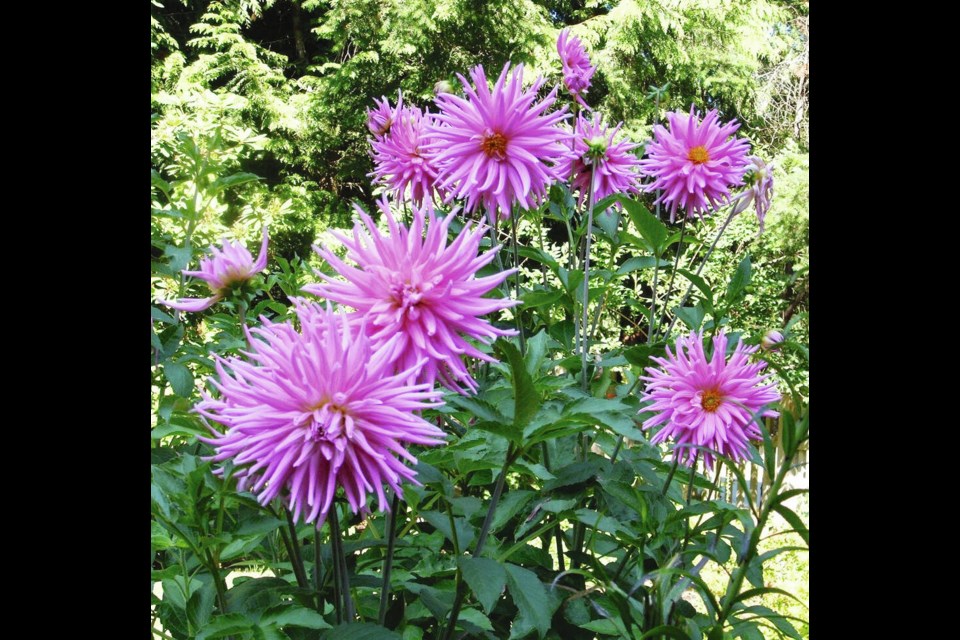Dear Helen: The dahlias that have grown and bloomed in my garden have remained in the ground for several years. The clumps are perhaps overdue for lifting and dividing. When should I do this? I don’t have a suitable cold storage area for over-wintering them.
B.W.
Since your clumps of tuberous roots have over-wintered and regrown successfully over several years, in your place I would simply leave them stored where they are, in the ground, for another winter and dig, divide, and replant in the spring.
When the tops have blackened with the first frost, cut the stems down and mark the site of each clump. Identify each one, with the variety name if you have it or with the plant height and flower colour.
I usually make a mound of soil over each dahlia clump and, for easy visibility and a little extra protection, I top the soil with a shallow layer of aged sawdust or wood shavings. If extreme cold is predicted, I pile a further mound of a loose mulch such as dry leaves or/and straw over the clumps.
In the spring, when the soil is no longer wet and has begun to warm, dig up the clumps. Look for nubs of growth at the base of the old stem. When dividing a clump, make sure that each tuber you keep for replanting has a piece of stem with a growth bud.
Prepare planting sites ahead of time if possible, digging the soil over deeply and mixing in lime, compost and fertilizer. Plant most types around 12.5 cm deep, a little deeper for tall, top-heavy plants. Before filling in the planting hole, insert a stout stake for tall dahlias.
Dear Helen: The compost I make is almost all grass clippings from lawn mowing. When I mix the compost into other soils in my veggie pod planter, the lettuce and onions I try to grow do not do well. Is it because the compost is made of grass mowings? Should I spread the compost on my flower gardens or potato patch?
L.C.
I’m wondering how you managed to create usable compost from almost entirely grass clippings. Piled up on their own, grass mowings melt down into an airless, smelly mass. For a finished compost with a nice earthy odour and texture, the high-nitrogen grass needs to be balanced with drier, high-carbon matter such as dried leaves.
Grass clippings are a valuable addition to a compost heap when added in shallow layers between or mixed into other materials being composted. They are also beneficial, used alone or mixed half and half with aged sawdust, as a mulch in flower beds and vegetable plots and around shrubs and trees. Used alone, their depth should be limited to five cm to avoid a smelly melt-down.
In “Vegepod” and other types of planters and pots, for the best possible, problem-free plant growth, consider starting out with a purchased all-purpose potting mix. For increased heft and “staying power” in the mix add about one-third as much purchased, sterilized, soil with some weight. Coconut fibre (coir) enhances moisture retention to a mix and acts as a buffer against temperature extremes.
Though this may not apply to your situation, I should mention that grass clippings taken from a lawn that has been treated with a herbicide should not be used in a compost heap, or as a mulch in garden beds. where they can damage plants.
Weekend column. I’ll be taking a break from writing a Saturday column for the Labour Day weekend. May you enjoy the fruits of your gardening labours over the holiday.
GARDEN EVENTS
VHS meeting. The Victoria Horticultural Society will meet on Tuesday, Sept. 3, from 7:15 to 9 p.m. in the Garth Homer Centre, 813 Darwin Ave. Connie Davis, who has grown, shown and judged dahlias for 29 years, will share her knowledge on growing them. Non-member drop-in fee $5. vichortsociety.org.
Gordon Head meeting. The Gordon Head Garden Club will meet on Wednesday, Sept. 4, from 7 to 9 p.m. in the Gordon Head Lawn Bowling club, 4105 Lambrick Way. Mary Alice Johnson, proprietor of Full Circle Seeds and ALM Organic Farm in Sooke, will speak about her locally grown, climate adapted, certified organic seeds (fullcircleseeds.com). Visitors are welcome at no charge.



